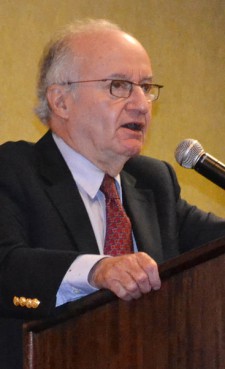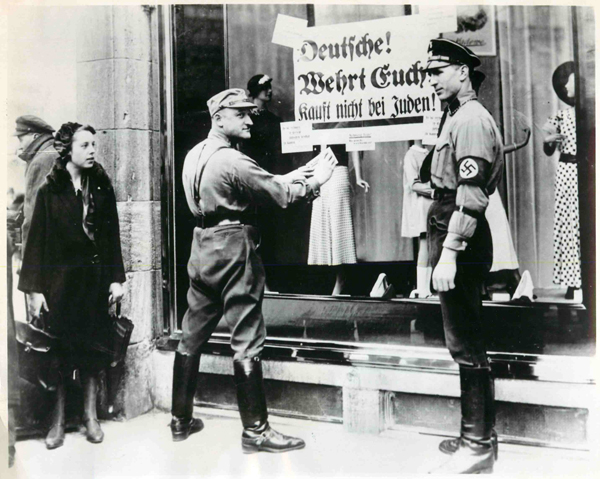(RNS) In any troubled relationship, “reconciliation” is easy to say but difficult to achieve. Especially when personal and historic memories of guilt, responsibility, shame, anger, distrust and pain are present. And most especially in the case of Germany and the Jewish people.

“Germans, defend yourselves, don’t trade in Jewish shops,” reads a sign Nazi troopers paste on a window of a Jewish-owned store in Berlin in 1938. Religion News Service file photo
But a recently published book, “Unwanted Legacies: Sharing the Burden of Post-Genocide Generations,” describes how two men from radically different backgrounds found reconciliation as friends and colleagues in their shared battle against bigotry and genocide.
Gottfried Wagner was born in Bayreuth, Germany, in 1947, the great-grandson of composer Richard Wagner, whose nationalist music and anti-Semitic worldview greatly influenced Adolf Hitler. Despite being part of an infamous family, Gottfried was destined to live a life of privilege and wealth.
Abraham Peck was born 11 months earlier in a displaced persons camp in Landsberg, Germany, is the only child of two Polish Jews who survived the Holocaust. While many extended family members were murdered, his mother and father were married in the Lodz ghetto in Poland in 1943, and they also endured imprisonment in German death camps.
As Gottfried Wagner learned about the evil philosophy and grotesque behavior of his fiercely anti-Jewish relatives, he publicly repudiated the obscene anti-Semitic legacy of the Wagner family, especially his grandmother, Winifred, a close personal friend of Hitler. She remained a Hitler admirer until her death at age 82 in 1980.
Indeed, when Hitler was briefly imprisoned in the Landsberg prison in 1924, Winifred provided the future Fuehrer with scarce writing paper along with her potent political and moral support. While at Landsberg, Hitler wrote “Mein Kampf,” his autobiography that became the fundamental text of Nazism.
Gottfried Wagner fled the suffocating atmosphere of Bayreuth and its worshipful cultlike music festivals dedicated to his great-grandfather. The younger Wagner’s doctoral thesis in musicology at the University of Vienna included a study of Kurt Weill, a Jewish composer who escaped Nazi Germany. While living in the U.S., Weill composed the music for “The Threepenny Opera,” “September Song,” and other works.
Gottfried Wagner later converted to Roman Catholicism, married an Italian and has lived in his wife’s country since 1983.
Peck’s parents, meanwhile, felt they could not live in blood-soaked Europe, the giant killing field of 6 million fellow Jews, and so they came to America and in 1949 began a new life with their son in Connecticut. Years later, Abraham Peck earned a Ph.D. at the University of East Anglia in England where he focused on the rise of anti-Semitism in Germany.
Returning to the United States and fluent in German, Hebrew and English, Peck began a distinguished academic career. Today he teaches history and directs the Center for Catholic-Jewish Studies at Saint Leo University in Florida.
The two scholars first met in 1991 during a Holocaust conference in New Jersey. Peck, along with other conference participants, wondered why Wagner’s great-grandson was invited to speak. As a child of Holocaust survivors, he also wondered what the scion of a notorious anti-Semitic family would say.
But Wagner’s powerful words of reconciliation, despite his poor English and heavy German accent, resonated in Peck’s head and heart. That evening, the two men began an intense conversation that lasted several hours. It was the start of a beautiful friendship that has strengthened in the decades since.

Rabbi A. James Rudin, the American Jewish Committee’s senior interreligious adviser, is the author of the recently published “Cushing, Spellman, O’Connor: The Surprising Story of How Three American Cardinals Transformed Catholic-Jewish Relations.”
The two men have traveled together to the Auschwitz-Birkenau death camp, wrote a book in German about the danger of historical amnesia of the Holocaust and current cases of genocide. They have lectured in many parts of the world, and their new book has brought an important message to a larger audience.
Peck describes his work with Wagner as “genuine and never timid … even when the accumulated fears of our parents’ generation threatened to pull us back from the brink of discovery.” The German-Jewish encounter, he says, “must be more than talk. It must be action that brings true meaning to the phrase ‘Never Again’ — to any people, anywhere, and at any time.”
(Rabbi A. James Rudin, the American Jewish Committee’s senior interreligious adviser, is the author of the recently published “Cushing, Spellman, O’Connor: The Surprising Story of How Three American Cardinals Transformed Catholic-Jewish Relations.”)
KRE/AMB END RUDIN





